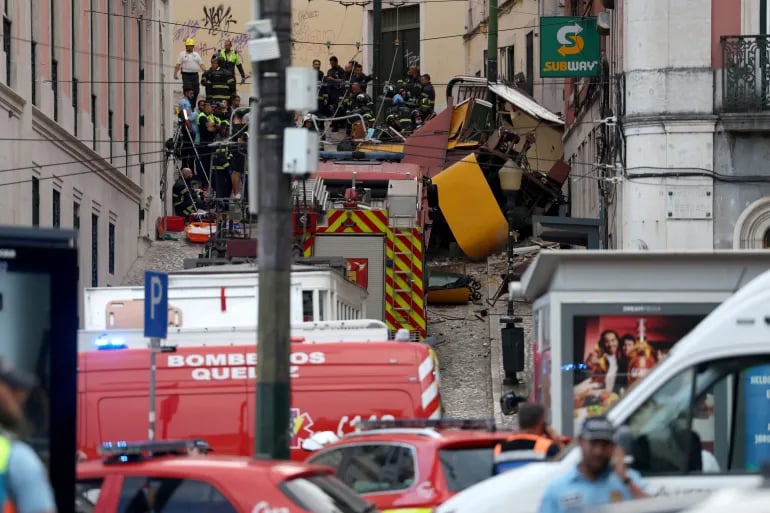Gloria Funicular Disaster: A City in Mourning
A look into the tragic funicular railway crash that claimed at least 17 lives in Lisbon, Portugal.
NEWS
Muhammad Atique
9/4/20253 min read


A day of national mourning has been declared in Portugal after a catastrophic accident on Wednesday evening, where a funicular railway car in Lisbon derailed and crashed, killing at least 17 people. The Gloria funicular, a cherished symbol of the city and a popular attraction for tourists, saw 18 more people injured in the disaster, five of whom are in critical condition. Authorities have not yet disclosed the identities or nationalities of the victims, but confirmed that some foreign nationals were among the deceased.
The tragic incident occurred around 6 p.m., as the city was entering its evening rush hour. Emergency crews were quick to respond, and officials confirmed that all victims were pulled from the wreckage in just over two hours. Initial footage from the scene showed a horrific tableau: a crumpled yellow and white tram-like car lying on its side, its metal frame twisted and its top caved in. It appeared to have slammed into a nearby building, and one witness reported seeing the vehicle topple onto a man on the pavement. The SITRA trade union confirmed that one of its members was among the victims of the crash.
A City in Mourning and an Investigation Underway
The tragic accident has plunged the Portuguese capital into a state of mourning. Lisbon Mayor Carlos Moedas lamented the event as a “tragic day for our city,” stating that “Lisbon is in mourning.” President Marcelo Rebelo de Sousa expressed his grief in a statement, while Prime Minister Luis Montenegro said the tragedy “has brought grief to… families and dismay to the country.” The widespread sorrow was echoed by international leaders, with European Union chief Ursula von der Leyen, Spanish Prime Minister Pedro Sánchez, and Italian Foreign Minister Antonio Tajani all taking to social media to express their condolences to the victims and their families.
As is customary in public transportation accidents, the Prosecutor General's Office has launched a formal investigation into the cause of the disaster. Police investigators are on-site, meticulously inspecting the wreckage and the surrounding area. The cause of the accident remains unknown, though eyewitnesses reported that the streetcar hurtled uncontrollably down the steep hillside.
The Beloved Gloria Funicular
The Gloria funicular railway, also known as Elevador da Glória, is not just a mode of transport but a piece of Lisbon’s history. The funicular, a national monument since its opening in 1885, links the downtown district near Restauradores Square with the lively Bairro Alto, a neighborhood known for its nightlife. It is one of three funicular lines operated by the municipal public transport company Carris and is used by an estimated 3 million people annually, drawing both tourists and residents.
The funicular operates with two cars, each capable of carrying around 40 people. They are attached to opposite ends of a haulage cable, with traction provided by electric motors on both cars. Video footage from onlookers, aired on CNN Portugal, captured the lower car shaking violently at the moment the other funicular derailed. The passengers inside the lower car could be seen jumping out of windows as onlookers shouted in panic.
The public transport company, Carris, has issued a statement confirming that “all maintenance protocols have been carried out,” including daily inspections and weekly and monthly maintenance programs. In the wake of the tragedy, Lisbon’s city council suspended the operations of other streetcars and ordered immediate inspections to ensure public safety.
The Human Toll and a Broader Context
The accident comes at a sensitive time for Lisbon, a city that has experienced a tourism boom over the past decade. Visitors from countries like Britain, Germany, Spain, and the United States flock to the popular downtown area, particularly during the summer months. The British Foreign, Commonwealth and Development Office has confirmed it is in touch with local authorities and stands ready to provide consular assistance to any affected British nationals.
The tragic loss of life has resonated deeply, with the Prime Minister's office noting the event has brought "grief to...families and dismay to the country." The ongoing investigation is aimed at bringing clarity to what caused such a catastrophic failure of a system that has safely transported millions for over a century. The focus now is on understanding how an accident of this scale could occur and ensuring that such a tragedy never happens again.
